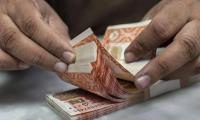Berlin: Most Germans will be "vaccinated, cured or dead" from Covid-19 in a few months, Health Minister Jens Spahn warned on Monday as he urged more citizens to get jabbed.
"Probably by the end of this winter, as is sometimes cynically said, pretty much everyone in Germany will be vaccinated, cured or dead," Spahn said, blaming "the very contagious Delta variant".
"That is why we so urgently recommend vaccination," he added. The stark warning comes as Germany is racing to contain a record rise in coronavirus infections in recent weeks, with hospitals sounding the alarm about overflowing intensive care units.
Despite widespread access to free coronavirus vaccines, just 68 percent of the German population is fully vaccinated, a level experts say is too low to keep the pandemic under control. Germany, the EU’s most populous country, added another 30,643 cases on Monday, according to the Robert Koch Institute health agency, bringing the total since the start of the pandemic to just over 5.3 million.
Almost 100,000 people have died so far, including 62 over the past 24 hours. "We have a very, very difficult situation in many hospitals," Spahn said. Germany last week announced tougher coronavirus curbs to contain the ferocious fourth Covid wave.
In regions with high hospitalisation rates, the unvaccinated will be barred from public spaces like cinemas, gyms and indoor dining. Employees are asked to return to working from home whenever possible, while anyone going into the workplace has to prove they are vaccinated, recovered or have recently tested negative -- a system known as "3G".
The same rule applies on public transport in those areas. Several of Germany’s hardest hit regions, including Bavaria and Saxony, have gone even further by cancelling large events such as Christmas markets and effectively barring the unvaccinated from non-essential public life. All vaccinated adults have also been urged to get a booster shot to combat waning vaccine efficacy after six months.
The worsening coronavirus has ignited a debate about whether Germany should follow Austria’s example and introduce mandatory vaccinations. Spahn, who is in a caretaker position until Germany’s incoming new government is officially installed, told reporters he remained "sceptical" about mandatory jabs.
But health expert Karl Lauterbach from the centre-left Social Democrats, which narrowly won September’s general election, said he "can no longer rule it out" and it may even be unavoidable to defeat the Delta variant.
Bavarian premier Markus Soeder has echoed the sentiment, as have several other leading politicians. Outgoing chancellor Angela Merkel’s spokesman, Steffen Seibert, said it was "sensible" to at least have a discussion about mandatory jabs. He stressed however, that it would be for the new government to make the decision.
The leaders of Germany’s 16 regional states have already said they want legislation to be introduced requiring health workers and those who care for the elderly and vulnerable to get Covid jabs.
Meanwhile, beyond killing millions and ravaging economies and health systems, the coronavirus pandemic has taken a devastating socioeconomic toll with women and migrants among the most affected, the Red Cross said Monday.
The International Federation of Red Cross and Red Crescent Societies warned in a new report that the secondary effects of the crisis had disproportionately impacted already vulnerable groups.
The pandemic has pushed many out of work, leading to widespread income loss, it said, pointing to data gathered by its 192 national societies. The crisis also increased food insecurities, cut access to education and to protections against violence while exacerbating mental health issues, said the report entitled "Drowning just below the surface". "Our research shows what we have long suspected and feared, namely that the destructive secondary impacts of this pandemic have damaged the fabric of our society and will be felt for years, if not decades, to come," said IFRC President Francesco Rocca.
The report paints a bleak picture of "people who were already vulnerable, due to conflict, climate change, and poverty, have been pushed further towards the edge," he told reporters. Around the world, the report found that women had been particularly hard-hit.
They were more likely than men to have lost work, partly as they more often work in the informal economy and in sectors heavily impacted by restrictions like tourism. The report also highlighted how lockdowns had created greater social isolation, leaving more women exposed to domestic violence.
Almost all national societies said they had seen a need to increase protection services for victims of sexual and gender-based violence, the report said. It pointed for instance to the Philippines, where the UN estimated 114,000 additional women experienced physical and sexual violence in 2020 due to quarantine measures.
Migrants, refugees and people displaced within their countries, who already figured among the world’s most vulnerable people, were also among those disproportionately impacted, it said. A survey of the national societies showed that having a migrant background was the second biggest vulnerability in terms of socioeconomic impacts of the pandemic after homelessness.
The main impact was on employment, with 80 percent of Syrian refugee households surveyed in Turkey saying at least one family member had lost their job. Job loss is often made worse for migrants and the displaced since they often lack access to government protection systems, the report pointed out.
In a related development, Dutch Prime Minister Mark Rutte on Monday slammed three nights of unrest over anti-Covid measures as "pure violence’ by "idiots" and vowed to prosecute those responsible. The Netherlands was taking stock after a weekend that saw dozens of violent protests across the country against the government’s anti-coronavirus measures.
At least 130 people have been arrested, four people wounded and several police officers injured since the violence first erupted on Friday, when a protest in the port city of Rotterdam turned into running battles between police and rioters.
The unrest in Rotterdam and in several cities around the country "is pure violence under the guise of protest," Rutte told Dutch media on Monday. "I understand that there is a lot of tension in society because we have been dealing with the scourge of corona for so long," Rutte said.
He said he would always defend the right to protest, but "I will never accept that idiots use pure violence," he said. The Netherlands went back into partial lockdown on November 13, and is considering so-called "2G measures," allowing bars and cafes to ban people who have not been vaccinated.
The World Meteorological Organisation flag. — AFP FileGENEVA: Global temperatures hit record highs last year, and...
This image shows the outside view of the U.S. Senate. — AFP/FileWASHINGTON: Billions of dollars in foreign aid for...
Each year, many African migrants brave the perilous “Eastern Route” across the Red Sea and through war-scarred...
State Department US building can be seen in this picture. — AFP/FileWASHINGTON: The U.S. State Department’s annual...
Donald Trump. — AFP/FileNEW YORK: The judge overseeing Donald Trump’s criminal hush money trial on Tuesday warned...
Abortion-rights activists hold a protest on April 17 in Phoenix. — AFP WASHINGTON: The idea of a doctor in the...







